As a foreigner living the expat life you have the fabulous opportunity to go shopping in new and exciting places. Yes, I can hear your groans coming from various dark corners of the globe. I know you don’t all live in Singapore or Dubai or Paris, and some of you ache for the joy of exploring big, luxury shopping emporiums, but trust me, fascinating shopping experiences can be had in other places. Such as Makola market in Accra, the capital of Ghana, West Africa.
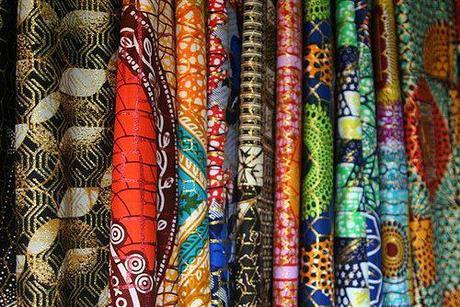
Fabric for sale in Makola Market
Photo © Andrea Papitto
I know, dear readers, that you slavishly read every word I write, so you are aware of course that I moved to Moldova in Eastern Europe a few months ago. Having visited the central market in the capital Chisinau (see last week’s post) I could not help remembering the very different market in Ghana, West Africa, where I happily expated for a number of years. So, allow me to offer you here the re-posting of a story about my sweaty shopping adventure in a tropical market. (Fortunately the smells don’t move through cyberspace.)
THE EXPAT GIRLS GO SHOPPING
One morning over coffee my friends Tara and Natalie and I plan a trip to Makola market. Tara from Canada is in need of bead supplies for her jewelry-making business. Natalie from the USA needs a wedding dress. Instead of a wedding at home in California, she and her man Max prefer a Ghanaian ceremony here. Contemporary Ghanaian fashion being stunning, Natalie covets a locally designed gown, and what better place than Makola market to buy fabric?
Me? I‘m looking for a length of market cloth. Something bright and colorful for a skirt, and maybe some for a table cloth. I never have enough fun table cloths. And maybe there’ll be something else that strikes my fancy.
African markets are fabulous places, and don’t let anyone tell you different. You can find things there you won’t find in any shopping mall in America, no matter how much money you have. Such as mud cloth and thunder stones and dried shrimp by the kilo and little monkey skulls and porcupine quills.
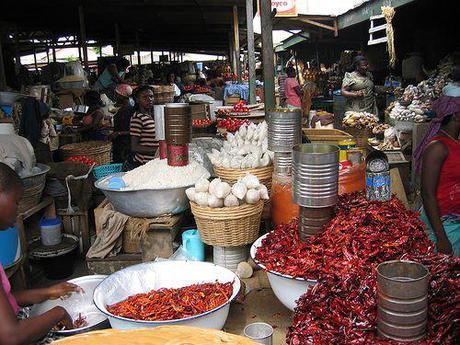
A typical Ghanaian market stall
And of course you can buy interesting food and charcoal braziers and cell phones and long wooden fufu pounders. Oh, and let’s not forget the beauty products, such as bleaching creams and hair dye and shea butter, which is wonderful stuff for chapped lips. I tried it out during our cold and dry Christmas visit to Virginia, and I had lips soft as a baby’s bottom.
However, interesting similarities exist. In Makola market, as in an American shopping mall, you can have your hair done, your shoes repaired, and your teeth fixed. It’s cheaper in the market here, but you might want to pass up some of these services.
An American shopping mall is redolent of money and perfume and potpourri and greasy french fries. Makola has smells you will never encounter at the mall: Roasting plantain, simmering palm nut soup, dried fish, open gutters, goat droppings. Really, it’s a mind-expanding experience.
So, one sweaty tropical morn, the three of us pile into a pink taxi and find our way to the sprawling market downtown. First we go in search of Tara’s beading supplies. She’s a master at bargaining and makes the market mammies laugh even when they don’t get the joy of suckering a big price out of an obruni (foreigner, white person).
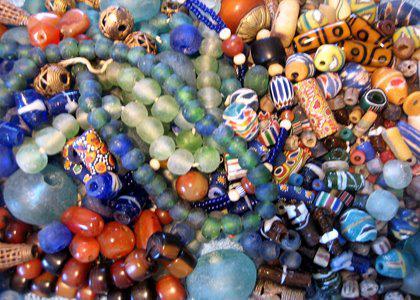
Just a small sample of my own collection of beads
Mission accomplished, we head for the cloth section. It’s easy to become over-stimulated taking in all the noise, color and hustle and bustle of the market. The selection of cloth is staggering. Stall after stall after stall has neatly folded lengths of cloth on display, hanging on racks or stacked in colorful piles.
We study the various motifs incorporated in the designs. Birds, flowers, fish, an occasional fruit or vegetable are to be expected, as are the traditional adinkra symbols, Ashanti stools and cowry shells. More unusual are the various human body parts that appear in the designs–eyes, hands, knobby feet. Icons of modern civilization also find their way on African fabrics — cell phones, keys, screw-in light bulbs, computers.
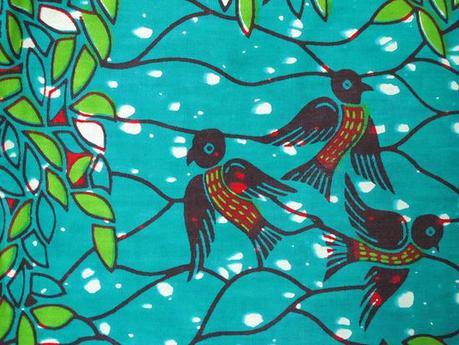
Birds are prettier than cell phones
So, I have no trouble at all finding fun pieces to use as table cloths. But interesting as they are, these fabrics are not suitable for a wedding dress, at least not the one Natalie has in mind, so we plow on down the crowded streets and alleys, trying not to trip and fall into a slimy, putrid gutter.
We discuss Natalie’s wedding dress needs with several market ladies. They are friendly and curious.
“You marry a Ghanaian man?” they want to know.
Natalie tells them no, and we joke with them about marriage. They are not a romantic lot. One rotund mammie has just kicked her man out the door. “He no good. All day he do nothing. I work all day and he take my money and buy beer!”
“I am sorry,” I say solemnly. Marital unhappiness is a sad thing.
“I no be sorry,” says she, eyes flashing. “What I need man for, ey? I have money, that’s better.”
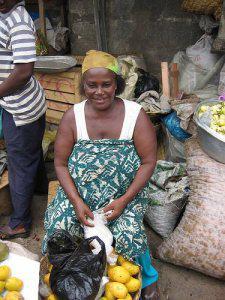
Market mammy
They all laugh uproariously, their bosoms quivering in merriment. One thing they don’t have in Makola Market is snooty salesgirls wearing size one clothes and four-inch heels, the type of chick who looks down her nose at you in your size eight or ten. These Ghanaian women wear flip-flops and their generous bodies are wrapped in market cloth with designs of fish or neckties. They tell us we are too skinny and should eat more fufu. They’re fun and helpful and point us in the right direction and finally, Natalie finds her fabric.
It’s white with shimmery ribbons of bright color running through it. It’s gorgeous. Will work great with the pattern she has chosen, a modern Ghanaian fashion design. I can’t wait to see it.
By now we are exhausted, hungry and thirsty. There is no such thing as a food court in the market; food is everywhere, carried on women’s heads, bubbling in pots by the side of the road, served up in little chop bars along the street. The three of us consider our needs, which include a place to sit and rest, and sanitary facilities, preferably of the enclosed variety. So we bail out of the market and find us a funky Rasta eatery nearby. It’s one the Peace Corps volunteers enjoy so it’s good enough for us.
And just like our sisters back home in vast shopping malls and big city shopping centers, we have lunch. Not a Greek salad, though.

